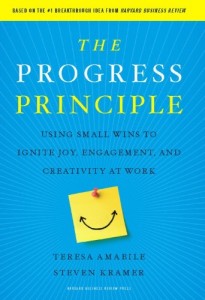I’m picking up a new book this week—it is called The Progress Principle: Using Small Wins to Ignite Joy, Engagement, and Creativity at Work. I learned about the book from an interview I read recently by Daniel Pink. In the book, Pink interviews the book’s authors, Harvard Business School Professor, Teresa Amabile, and Developmental Psychologist, Steven Kramer.
 You may recall that Daniel Pink is the author of Drive, a best-selling book that I reviewed last year in WorkPuzzle, and he is an expert on the topic of motivation. He called The Progress Principle the best business book he has read in many years. Because there are more than 11,000 business books published each year, that got my attention!
You may recall that Daniel Pink is the author of Drive, a best-selling book that I reviewed last year in WorkPuzzle, and he is an expert on the topic of motivation. He called The Progress Principle the best business book he has read in many years. Because there are more than 11,000 business books published each year, that got my attention!
The basic premise of the book explores the questions:
How and when are people most engaged and motivated at work?
To research this important topic, the authors recruited 238 people across seven companies and had each of them complete questionnaires and diary entries over a period of time. In total, they amassed over 12,000 days worth of data. In addition, they connected with more than 700 business managers to get their perspectives as well.
What were their findings?
What motivates people the most, day-to-day, is making progress on meaningful work.
I’ll share parts of the interview below. Hopefully, it will spur you on to learn more about this important topic as well.
1. Focus on small wins and incremental steps.
Q: Lots of business books talk about the need for bold, audacious goals — and deride those who “think small.” But your book, which is based on research far more rigorous than its counterparts, takes a different stance. You emphasize the power of “small wins.” Why are those so important in the performance of individuals and organizations?
A: Try to remember the last time you – or anyone you know – had a truly enormous breakthrough in solving a problem or achieving one of those audacious goals. It’s pretty hard, because breakthroughs are very rare events.
On the other hand, small wins can happen all the time. Those are the incremental steps toward meaningful (even big) goals. Our research showed that, of all the events that have the power to excite people and engage them in their work, the single most important is making progress – even if that progress is a small win. That’s the progress principle. And, because people are more creatively productive when they are excited and engaged, small wins are a very big deal for organizations.
2. 95% of managers igore the most potent motivators.
Q: In addition to examining 12,000 daily diary entries from workers, you also surveyed a few hundred leaders — from CEOs to project managers — about what they think really motivates employees. What did you find out?
A: Our survey showed that most leaders don’t understand the power of progress. When we asked nearly 700 managers from companies around the world to rank five employee motivators (incentives, recognition, clear goals, interpersonal support, and support for making progress in the work), progress came in at the very bottom.
In fact, only 5% of these leaders ranked progress first – a much lower percent than if they had been choosing randomly! Don’t get me wrong; those other four motivators do drive people. But we found that they aren’t nearly as potent as making meaningful progress.
3. Negative events significantly outweigh positive events.
Q: Negative events have a more powerful impact than positive ones. Why?
A: We were pretty shocked to discover the dominant effect of negative events on inner work life – people’s mostly-hidden emotions, perceptions, and motivations at work. Setbacks have a negative effect on inner work life that’s 2-3 times stronger than the positive effect of progress.
When we checked into whether other researchers had found something similar, we learned that it’s a general psychological effect; “bad is stronger than good.” The reason could be evolutionary. Maybe we pay more attention to negatives, and are more affected by them, out of self-preservation. So – because positive inner work life is so important for top performance, leaders should do whatever they can to root out negative forces.
4. Time pressure only helps those who are working on legitimate, mission-critical deadlines.
Q: I was especially intrigued by your findings about time pressure. Sometimes it helps; other times it hurts. Tell us what you found.
A: The typical form of time pressure in organizations today is what we call “being on a treadmill” – running all day to keep up with many different (often unrelated) demands, but getting nowhere on your most important work. That’s an absolute killer for creativity. Generally, low-to-moderate time pressure is optimal for creativity.
But we did find some instances in which people were terrifically creative under high time pressure. Almost invariably, it was quite different from being on a treadmill. Rather, people felt like they were “on a mission”— working hard to meet a truly urgent deadline on an important project, and protected from all other demands.
These are all important topics that I can apply to my personal performance as well as working with those on my team. I’ll provide an update to what I’ve learned…after I finish the book.
Editor's Note: This article was written by Ben Hess. Ben is the Founding Partner and Managing Director of Tidemark, Inc. and a regular contributor to WorkPuzzle. Comments or questions are welcome. If you're an email subscriber, reply to this WorkPuzzle email. If you read the blog directly from the web, you can click the "comments" link below.

